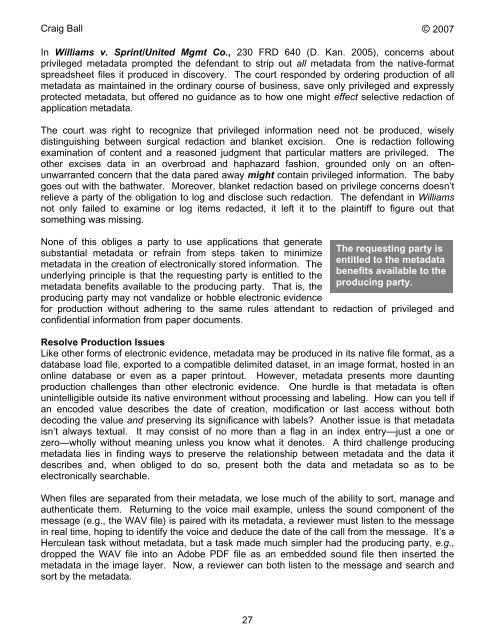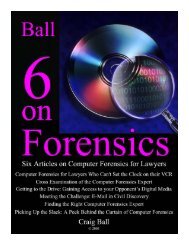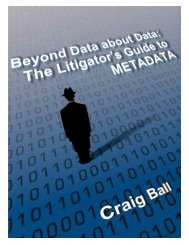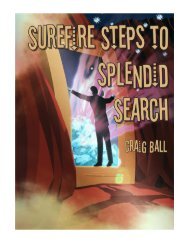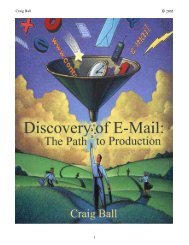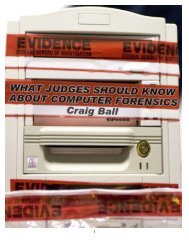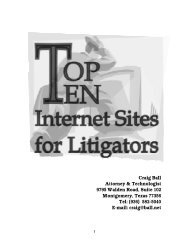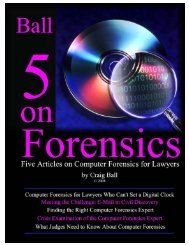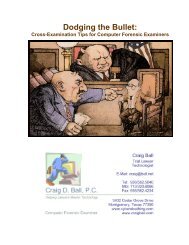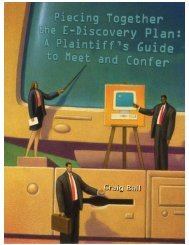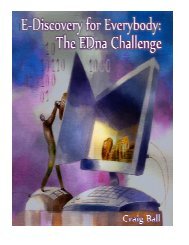Six Articles on Electronic - Craig Ball
Six Articles on Electronic - Craig Ball
Six Articles on Electronic - Craig Ball
Create successful ePaper yourself
Turn your PDF publications into a flip-book with our unique Google optimized e-Paper software.
<strong>Craig</strong> <strong>Ball</strong> © 2007<br />
In Williams v. Sprint/United Mgmt Co., 230 FRD 640 (D. Kan. 2005), c<strong>on</strong>cerns about<br />
privileged metadata prompted the defendant to strip out all metadata from the native-format<br />
spreadsheet files it produced in discovery. The court resp<strong>on</strong>ded by ordering producti<strong>on</strong> of all<br />
metadata as maintained in the ordinary course of business, save <strong>on</strong>ly privileged and expressly<br />
protected metadata, but offered no guidance as to how <strong>on</strong>e might effect selective redacti<strong>on</strong> of<br />
applicati<strong>on</strong> metadata.<br />
The court was right to recognize that privileged informati<strong>on</strong> need not be produced, wisely<br />
distinguishing between surgical redacti<strong>on</strong> and blanket excisi<strong>on</strong>. One is redacti<strong>on</strong> following<br />
examinati<strong>on</strong> of c<strong>on</strong>tent and a reas<strong>on</strong>ed judgment that particular matters are privileged. The<br />
other excises data in an overbroad and haphazard fashi<strong>on</strong>, grounded <strong>on</strong>ly <strong>on</strong> an oftenunwarranted<br />
c<strong>on</strong>cern that the data pared away might c<strong>on</strong>tain privileged informati<strong>on</strong>. The baby<br />
goes out with the bathwater. Moreover, blanket redacti<strong>on</strong> based <strong>on</strong> privilege c<strong>on</strong>cerns doesn’t<br />
relieve a party of the obligati<strong>on</strong> to log and disclose such redacti<strong>on</strong>. The defendant in Williams<br />
not <strong>on</strong>ly failed to examine or log items redacted, it left it to the plaintiff to figure out that<br />
something was missing.<br />
N<strong>on</strong>e of this obliges a party to use applicati<strong>on</strong>s that generate<br />
substantial metadata or refrain from steps taken to minimize<br />
metadata in the creati<strong>on</strong> of electr<strong>on</strong>ically stored informati<strong>on</strong>. The<br />
underlying principle is that the requesting party is entitled to the<br />
metadata benefits available to the producing party. That is, the<br />
producing party may not vandalize or hobble electr<strong>on</strong>ic evidence<br />
The requesting party is<br />
entitled to the metadata<br />
benefits available to the<br />
producing party.<br />
for producti<strong>on</strong> without adhering to the same rules attendant to redacti<strong>on</strong> of privileged and<br />
c<strong>on</strong>fidential informati<strong>on</strong> from paper documents.<br />
Resolve Producti<strong>on</strong> Issues<br />
Like other forms of electr<strong>on</strong>ic evidence, metadata may be produced in its native file format, as a<br />
database load file, exported to a compatible delimited dataset, in an image format, hosted in an<br />
<strong>on</strong>line database or even as a paper printout. However, metadata presents more daunting<br />
producti<strong>on</strong> challenges than other electr<strong>on</strong>ic evidence. One hurdle is that metadata is often<br />
unintelligible outside its native envir<strong>on</strong>ment without processing and labeling. How can you tell if<br />
an encoded value describes the date of creati<strong>on</strong>, modificati<strong>on</strong> or last access without both<br />
decoding the value and preserving its significance with labels? Another issue is that metadata<br />
isn’t always textual. It may c<strong>on</strong>sist of no more than a flag in an index entry—just a <strong>on</strong>e or<br />
zero—wholly without meaning unless you know what it denotes. A third challenge producing<br />
metadata lies in finding ways to preserve the relati<strong>on</strong>ship between metadata and the data it<br />
describes and, when obliged to do so, present both the data and metadata so as to be<br />
electr<strong>on</strong>ically searchable.<br />
When files are separated from their metadata, we lose much of the ability to sort, manage and<br />
authenticate them. Returning to the voice mail example, unless the sound comp<strong>on</strong>ent of the<br />
message (e.g., the WAV file) is paired with its metadata, a reviewer must listen to the message<br />
in real time, hoping to identify the voice and deduce the date of the call from the message. It’s a<br />
Herculean task without metadata, but a task made much simpler had the producing party, e.g.,<br />
dropped the WAV file into an Adobe PDF file as an embedded sound file then inserted the<br />
metadata in the image layer. Now, a reviewer can both listen to the message and search and<br />
sort by the metadata.<br />
27


